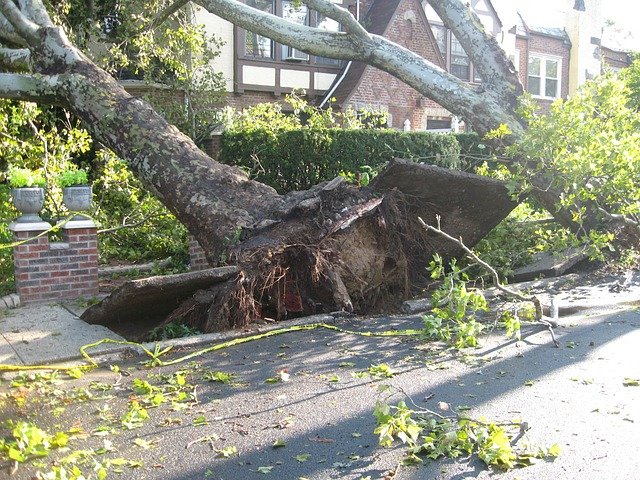
As co-insured parties, you and your mortgage lender both have a stake in the value and condition of your home.
Your stake in your property value is obvious. But the lender also has a vested interest. Your home’s value is the collateral for the loan. So, catastrophic damage raises serious questions about the status of a mortgage (or a deed of trust). If an unexpected calamity damages a home, here’s what buyers and owners should know about the interplay between the insurer and the mortgage company.
Unpleasant Surprises Before Closing
Imagine a seller and buyer, both excited about getting to closing. Just days before the date, a formerly trimmed and healthy tree comes down on the seller’s roof. Caused by an unusually violent storm, this was a truly unforeseen emergency — not the fault of the seller. And it resulted in serious damage. Now what?
Very often, the buyer will opt to get the deposit back and look elsewhere. Not all deals close — and here’s a perfect example of a reason to cancel the agreement. The parties now must sign a formal cancellation of their contract, which legally lets the seller move ahead with repairs and getting the home in market-ready condition again.
But what if the buyer is undaunted? Can things be worked out with the seller somehow? This is when everyone turns to the purchase agreement, looking for language addressing unexpected problems arising between the signing of the agreement and the closing. Typically, this language will direct the seller to restore the property as soon as reasonably possible. If the repairs can be done quickly, the real estate agents may manage to reschedule the closing under the contract.
Assigning the Claim

Alternatively, the buyer can try to save the deal by accepting the property as-is. In this case, an insurance assignment is added to the stack of closing paperwork. The seller must transfer the claim over to the buyer, who will make the covered repairs. The seller may need to fund the insurance deductible through the escrow account for the buyer. Or the seller could pay the buyer, and collect funds from the insurer later.
This is not a casual agreement. The insurance company, the buyer’s lender, and state law have to allow the assignment of the insurance claim. This is because an assignment of a claim brings in another person, introducing a new element of risk. So, to keep valid coverage, the buyer must make the purchase contingent on an insurer-approved assignment.
Special Closing Rules in Storm Season
States are ranked for their susceptibility to storm surges. Florida is #1, followed by Louisiana, then Texas, New Jersey and New York. Florida’s annual hurricane season stretches from the beginning of June through the end of November. State law permits insurers to suspend storm damage coverage when a tropical storm or hurricane approaches Florida in those months, unless the paperwork was prepared in advance. This prevents waves of opportunistic policy purchases just before approaching storms.
So, get familiar with your insurer’s rules if you’re planning a real estate purchase or sale during storm season. To be prepared is to be protected, no matter what the weather does when the buyer is ready to take the keys.
It’s a good idea to sit down with your insurance agent once you purchase your home in a storm-prone area, to discuss wind damage coverage and other important types of coverage. Note that standard a homeowner’s insurance policy will not pay for flood damage.
Interplay Between Insurance and Mortgage Companies
Whether you’re getting ready to close, or have owned your home for years, it’s best to know how your mortgage servicer interacts with insurance claims, payouts, and renovations. These interactions are guided by your state’s law and your mortgage (or deed of trust). Agreements you have signed with your lender could impact these interactions.
A homeowner’s response to an incident should involve prompt calls to both the insurance company and the mortgage company. Here’s what the policy holder might expect:
- The adjuster examines the damage and calculates payments. An engineer might also come to look at the structural damage to assist at this stage.
- If the insurance company issues a payment, it may be payable to the insured homeowner, the mortgage lien holder, or both.
- If the mortgage company holds the funds in escrow for the major repairs, it funds the restoration through partial payments as the work is done and inspected. It might endorse the full payment over to the homeowner for a payment of any amount it considers a small claim.
- Third-party services are not covered by the insurance proceeds. Some homeowners hire their own adjusters to assess the damage, particularly when the costs are significantly higher than the amount the insurance company appears willing to cover.
- In some cases, a mortgage company channels insurance proceeds to the loan balance rather than to the restoration. If the damage constitutes a total loss, or the value of the home is seriously reduced because of the disaster, the lender might require payments from the homeowner.
- Loss of use coverage, to support the homeowner’s extra expenses while the home is restored, is unrelated to the mortgage, and will go to the homeowner to pay for food, lodging, and transit costs.
- Payments for the home’s contents are also separate from the damage to the home, and the mortgage company will not be involved with them. The owner completes a proof of loss form from the insurer, to determine the purchase details and replacement value of items. Some policies pay out only actual cash value. The homeowner is well advised to keep a list and photo evidence of the home’s contents, in case there is ever a fire, pipe break, weather crisis, theft, etc.
Coverage for home restorations can be higher than the costs of new construction, depending on cleanup costs and other factors. But state law forbidding lenders from requiring excessive insurance policies may limit what the policy can pay.
Pro tip: A casualty loss can lower the cost basis of the home by the amount of the deductible and insurance payments. If the insurance company pays out $50,000 to resolve the damage, for example, the owner’s cost basis for the home is that much lower. Later, when the owner sells, the taxable gain is that much less.
Thinking Ahead If an insurer sends a release form or payment in full for the claim, your signature on the payment releases the claim. Proceed with caution, as results of damage do not always show up immediately, and reopening the claim later could be more difficult.
On the other side of the coin, there are cases in which the homeowner keeps payments but does not direct the money to the restoration job. In the case of later-discovered damage, the company could have grounds not to renew the policy. In turn, a decision not to renew could make the home generally uninsurable.
Needless to say, this will become an issue for any current or future mortgage company. Lenders require a homeowner’s policy in order to sustain the value of the loan collateral (the home). Loss of insurance may trigger the acceleration clause in the mortgage agreement, confronting the owner with a demand for the loan balance repayment.
☛ If you have an FHA-backed mortgage, your home restoration job may qualify for a 203(k) loan. If you’re buying, the Federal Housing Administration offers combined renovation and mortgage loans. What other kind of rehab loans could help? See Buying a Fixer-Upper: What Are the Best Financing Options? to explore alternatives.
As you can see, your mortgage company will care about any sudden change in your home’s condition. You and your mortgage company will have to work as a team to handle the results of an unexpected calamity. Prompt communication is the best policy.
Supporting References
Deeds.com: Natural (and Other) Disasters: How Emergencies Impact Titles and Mortgages (Aug. 7, 2020).
Alan M. Cohen for Stahl, Bernal, Davies, Sewell & Chavarria LLP: Buyers and Sellers Beware – Assignment of Hurricane Claims may be Invalid in Texas (undated).
Internal Revenue Service: Tax Topic No. 515. Casualty, Disaster, and Theft Losses (updated Mar. 26, 2021).
Maria M. Pirrone, CPA, LL.M. for the Journal of Accountancy: Taxpayers’ Valuation of Land Accepted; Inability to Establish Basis Limits Casualty Loss (Feb. 1, 2017).
Spickelmier Insurance: Closing a Home in Hurricane Season (Sep. 10, 2019).
United Wholesale Mortgage, LLC: Escrow Support (undated).
Timothy Burchard for the Merlin Law Group: After a Loss, Don’t Forget About Your Mortgage Company (Feb. 23, 2019).
Image credits: NOAA/Unsplash and Public Domain Images via Pixabay.
